The Mummy Read online
Page 24
Memory within the memory. His palace at Thebes when he had been a mortal man, and afraid of death, and afraid of humiliation. When he had had a harem of one hundred wives to pleasure, and it had seemed a burden.
"Have you had many lovers since I left?" he had asked Cleopatra.
"Oh, many men," she'd answered in a low voice mat was almost as hard as a man's voice for all its feminine resonance. "But none of them were lovers."
The lovers would come. Julius Caesar would come; and then the one who swept her away from all the things he'd taught her. "For Egypt," she'd cry. But it wasn't for Egypt. Egypt was Cleopatra then. And Cleopatra was for Antony.
It was getting light. The mist above the sea had paled, and he could see now the sparkling surface of the dark blue water.
High above, the pale sun burnt through. And at once he felt it working on him. He felt a sudden breath of energy pass through him.
His cheroot had long ago gone out. He pitched it into the void, and drawing out his gold cigarette case, took another.
A foot sounded on the steel deck behind him.
"Only a few hours, sire."
The match came up to light the cheroot for him.
"Yes, my loyal one," he said, drawing in the smoke. "We wake from this ship as if from a dream. And what are we to do in the light of day with these two who know my secret, the young scoundrel, and the aged philosopher who may pose the worst threat of all with his knowledge?"
"Are philosophers so dangerous, sire?"
"Lord Rutherford has great faith in the invisible, Samir. And he is no coward. He wants the secret of eternal life. He realizes what it really is, Samir."
No answer. Only the same distant and melancholy expression.
"And I'll tell you another little secret, my friend," he went on. "I've grown to like the man mightily."
"I've seen it, sire."
"He is an interesting man," Ramses said. And to his surprise he heard his voice break. It was hard for him to finish, but he did, saying: "I like to talk to him."
Hancock sat at his desk in the museum office, looking up at Inspector Trent from Scotland Yard.
"Well, as I see it, we have no choice. We seek a court order to enter the house and examine the collection. Of course if everything is as it should be, and there are no coins missing. . ."
"Sir, with the two we have now, that's almost too much to hope for.''
PART • 2
1
HE GRAND Colonial Hotel was a rambling pink confection of moorish arches, mosaic floors, lacquered screens and peacock wicker chairs, its broad verandas overlooking the shining sand and the endless blue of the Mediterranean beyond it.
Rich Americans and Europeans in perennial summer white thronged its immense lobby and other public rooms. An orchestra played Viennese music in one of its open bars. A young American pianist played ragtime in another. The ornate brass lifts, riding directly upwards beside the curving grand stair, seemed eternally in operation.
Surely if this resort had existed in any other place, Ramsey would have loved it. But Elliott could see in the very first hour of their arrival that Alexandria was a profound shock to him.
His vitality seemed immediately sapped. He fell quiet at tea, and excused himself to go wandering.
And that night at dinner, when the subject of Henry's abrupt departure for Cairo was raised, he was almost snappish.
"Julie Stratford's a grown woman," he said, glancing at her. "It's preposterous to think she requires the companionship of a drunken, dissolute being. Are we not, all of us, as you say, gentlemen?"
"I suppose so," Alex responded with predictable brightness. "Nevertheless he is her cousin and it was her uncle's wish-"
"Her uncle doesn't know her cousin!" Ramsey declared.
Julie cut the conversation short. "I'm glad Henry's gone. We'll join him in Cairo soon enough. And Henry in Cairo will be a cross as it is. Henry in the Valley of the Kings would be intolerable.''
"Quite right." Elliott sighed. "Julie, I am your guardian now. Officially."
"Elliott, the trip is far too difficult for you. You ought to go on to Cairo and wait for us there, also."
Alex was about to protest when Elliott motioned for silence. "That's out of the question now, dearest, and you know it. Besides, I want fo see Luxor again, and Abu Simbel, perhaps for the last time."
She looked at him thoughtfully. She knew that he was speaking the truth on both counts. He couldn't let her travel alone with Ramsey, no matter how much she wanted to. And he did want to see those monuments again. But she also sensed he had his own distinct priorities.
Regardless, her acceptance was quite enough for Elliott.
"And when do we go on to the Nile steamer?" Alex asked. "How much time do you need in this city, old boy?" he asked Ramsey.
"Not very much," Ramsey said dismally. "There is precious little left of the old Roman times which I hoped to see."
Ramsey, after devouring three courses without ever touching a knife or a fork, excused himself before the others had finished.
By the following afternoon, it was clear he was in a dismal state. He said almost nothing at luncheon; declined to play billiards and again went out walking. It was soon obvious that he was walking at all times of the night and day, and had left Julie entirely to Alex for the time being. Even Samir did not apparently have his confidence.
He was a man alone in the midst of a struggle.
Elliott watched all this; and then came to a decision. Through his man Walter he hired a young Egyptian boy, a hanger-on at the hotel who did nothing but continuously sweep off the red carpeted steps, to follow Ramsey. It was quite a risk. And Elliott felt ashamed. But this obsession was consuming him.
By the hour he sat in a comfortable peacock chair in the lobby reading the English papers, and watching all comings and goings. And then at odd moments, he would take reports from the Egyptian boy, who spoke tolerable English.
Ramsey walked. Ramsey stared for hours at the sea. Ramsey explored great fields beyond the city. Ramsey sat in European cafes, staring at nothing, drinking huge quantities of sweet Egyptian coffee. Ramsey had also gone to a brothel, and there he had astonished the greasy old proprietor by taking every woman in the place between sunset and sunrise. That meant twelve couplings. The old pimp had never seen anything like it. Elliott smiled. So he beds them in the same manner that he satisfies every other appetite, he thought. And this meant surely that Julie had not admitted him to her inner sanctum. Or did it?
Narrow alleyways, the old section of town, they called it. But it was no more than a few hundred years old, and no one knew that the great library had once stood here. That below on the hill had been the university where the teachers lectured to countless hundreds.
Academy of the ancient world, this city; and now it was a seaside resort. And that hotel stood on the very spot where her palace had been; where he had taken her in his arms and begged her to stop her mad passion for Mark Antony.
"The man will fail, don't you see?" he had pleaded. "If Julius Caesar had not been struck down, you would have been Empress of Rome. But this man will never give you that. He is weak, corrupt; he lacks the mettle."
But then, for the first time he'd seen the savage self-defeating passion in her eyes. She loved Mark Antony. She didn't care! Egypt, Rome, what did it matter? When had she ceased to be the Queen and become the mere mortal? He didn't know. He knew only that all his great dreams and plans were dissolving.
"What do you care about Egypt!" she had demanded. "That I be Empress of Rome? That's not what you want of me. You want that I should drink your magic potion, which you claim will make me immortal as you are. And to hell with my mortal life! You would kill my mortal life and my mortal love, admit it! Well, I cannot die for you!"
"You don't know what you're saying!"
Ah, stop the voices of the past. Listen only to the sea crashing on the beach below. Walk where the old Roman cemetery stood, where they laid her to rest beside Ma
rk Antony.
He saw the procession in his mind's eye. He heard the weeping. And worst of all, he saw her again in those last hours. "Take away your promises. Antony calls me from the grave. I want to be with him now.''
And now all trace of her was gone, save what remained inside him. And what remained in legend. He heard again the crowds who blocked the narrow streets, and flooded down the grassy slope to see her coffin placed within the marble tomb.
"Our Queen died free."
"She cheated Octavian."
"She was no slave of Rome."
Ah, but she could have been immortal!
The catacombs. The one place he had not ventured. And why had he asked Julie to come with him? How weak he'd become, that he needed her there. And to think, he'd told her nothing.
He could see the concern in her face. So lovely she looked in her long, lace-trimmed dress of pale yellow. These modern women had all seemed preposterously overdressed to him at first, but he understood the seductiveness of their clothing-the full sleeves tapering to tight cuffs at the wrists, the tiny waists and flowing skirts. They had begun to look normal to him.
And he wished suddenly that they were not here. That they were back in England again, or far away in America.
But the catacombs, he had to see the catacombs before they went on. And so with the other tourists they walked, listening to the droning voice of the guide, who spoke of Christians hiding here, of ancient rituals performed long before that in these rock chambers.
"You've been here before," Julie whispered. "It's important to you."
"Yes," he answered under his breath, holding her hand tightly. Oh, if only they could leave Egypt now and forever. What was the point of this agony?
The unwieldy party of chattering, whispering tourists came to a halt. His eyes moved anxiously over the wall. He saw it, the small passageway. The others moved on, cautioned again to remain with the guide, but he held Julie back, and then as the other voices died away, he switched on the electric torch and entered the passage.
Was it the same? He could not tell. He could only remember what had happened.
Same smell of damp stone; Latin markings on the wall.
They came to a large room.
"Look," she said. "There's a window there cut high in the rock, how amazing! And hooks in the wall, do you see it!"
It seemed her voice was very far away. He meant to answer, but that was not possible.
He stared into the gloom at the great rectangular stone to which she pointed now. She said something about an altar.
No, not an altar. A bed. A bed where he had lain for three hundred years, until that portal high up there had been opened. The ancient chains had pulled the heavy wooden blind, and the sun had come down, falling warm on his eyelids.
He heard Cleopatra's girlish voice:
"Ye gods, it's true. He's alive!" Her gasp echoing off the walls. The sun flooding down upon him.
"Ramses, rise!" she cried. "A Queen of Egypt calls you."
He'd felt the tingling in his limbs; felt the suddenly zinging sensation in his hair and skin. Half in sleep still he'd sat up and seen the young woman standing there, rippling black hair loose over her shoulders. And the old priest, shivering, jabbering under his breath, hands clasped as if in prayer, bowing from the waist.
' 'Ramses the Great," she had said.' 'A Queen of Egypt needs your counsel."
Soft dusty rays falling down from the twentieth-century world outside. The roar of motor cars on the boulevards of the modern city of Alexandria.
"Ramses!"
He turned. Julie Stratford was looking up at him.
"My beautiful one," he whispered. He took her in his arms, tenderly. Not passion, but love. Yes, love. "My beautiful Julie," he whispered.
In the lobby they took high tea. The whole ritual made him laugh. To eat scones, eggs, cucumber sandwiches, and not call this a meal. But why should he complain? He could eat three times what everyone else was eating and still be hungry for dinner.
He cherished this time alone with her. That Alex and Samir and Elliott were not about.
He sat staring at the parade of plumed hats, frilly umbrellas. And the big shiny open motor cars, chugging up to the side entrance, right along with the open leather carriages.
These were no longer the people of his time. The racial mix was different. She'd said he would see it was the same with the Greeks when they went there. Oh, so many places to go. Was he feeling relief?
"You've been so patient with me," he said, smiling. "You don't ask me to explain anything."
Ah, but she looked radiant; her dress was a pale flowered silk; lace at the wrists and those tiny pearl buttons he was growing to love. Thank God she had not worn an open gown since that first night at sea. The sight of all that flesh drove him mad completely.
"You'll tell me when you want to tell me," she said. "What I can't bear is to see you suffering."
"It's all as you said," he murmured. He drank down the tea, a beverage he didn't much like. It seemed to be half of something. "All gone without a trace. The mausoleum, the library, the lighthouse. All that Alexander built; and Cleopatra built. Tell me, why are the pyramids still standing at Giza? Why is my temple still standing at Luxor?"
"Do you want to see them?" She reached across the little table and took his hand. "Are you ready to leave here now?"
"Yes, it's time to go on, isn't it? And then when we've seen it all, we can leave this land. You and I. ... That is, if you want to remain with me."
Such lovely brown eyes with their deep fringe of brown lashes; and the pure sweetness of her mouth as she smiled. And wouldn't you know? The Earl had just come out of the lift, along with his charming nincompoop of a son, and Samir.
"I'll go with you to the ends of the earth," she whispered.
He held her gaze for a long moment. Did she know what she was saying? No. The question was, did he know what she was saying? That she loved him, yes. But the other, the other great question had never been asked, had it?
They had been heading up the Nile for the better part of the afternoon, the sun beating down with full force upon the striped awnings of the small, elegant steamer. The combination of Julie's purse and Elliott's gift for command had provided them with every luxury. The staterooms of the small boat were as fine as those of the P&O liner which had brought them across the sea. The saloon and dining room were more than comfortable. The cook was a European; the servants, with the exception, of course, of Walter and Rita, were Egyptian.
But the greatest luxury of all was that it was their craft. They shared it with no one else. And they had become, much to Julie's surprise, an extremely congenial group of travelers. Now that Henry was gone, that is. And for that she couldn't have been more grateful.
He'd fled like a coward as soon as they landed in Alexandria. And what a preposterous story, that he would prepare things for them in Cairo. Shepheard's Hotel would prepare things for them in Cairo. They had cabled before they ever started the journey south towards Abu Simbel. They did not know how long their cruise would be; but Shepheard's, the old standby of the British abroad, would be waiting.
Opera season was about to begin, they'd been advised. Should the concierge arrange for box seats for all of them? Julie had said yes, though she could not imagine how this trip would end.
She knew only that Ramses was in fine spirits; that he loved being on the Nile. That he had stared for hours from the deck at the palm trees and the golden desert on either side of the broad, gleaming strip of brown water.
No one had to tell Julie that these were the same airy, fanlike palms painted upon the walls of ancient Egyptian tombs. Or that the dark-faced farmers were drawing water from the river by the very same crude means they had used four thousand years ago. No one had to tell her that the many native boats which passed them were little changed since the time of Ramses the Great.
And the wind and the sun changed for no one.
But there was something she had to do
, and it could wait no longer. She sat contentedly in the saloon, idly watching Samir and Elliott play chess. And then when Alex rose from his game of solitaire and went out on the deck alone, she followed him.
It was almost evening; the breeze was cool for the first time, and the sky was slowly turning a deep shade of blue which was almost violet.

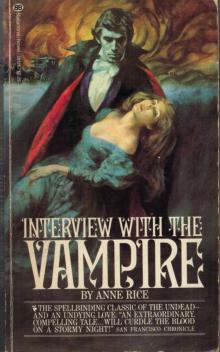 Interview with the Vampire
Interview with the Vampire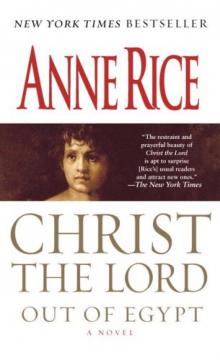 Christ the Lord: Out of Egypt
Christ the Lord: Out of Egypt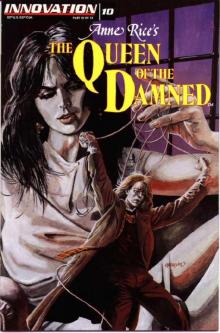 The Queen Of The Damned
The Queen Of The Damned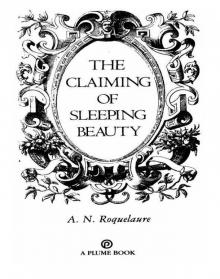 The Claiming of Sleeping Beauty
The Claiming of Sleeping Beauty Prince Lestat
Prince Lestat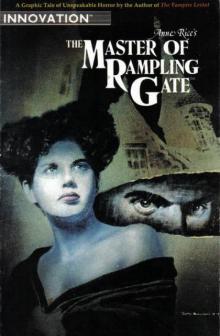 The Master of Rampling Gate
The Master of Rampling Gate The Vampire Lestat
The Vampire Lestat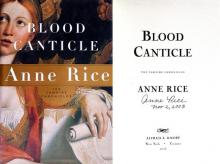 Blood Canticle
Blood Canticle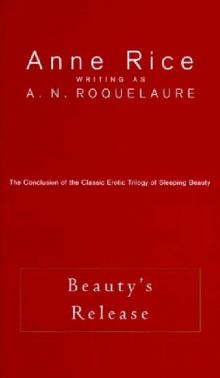 Beauty's Release
Beauty's Release Pandora
Pandora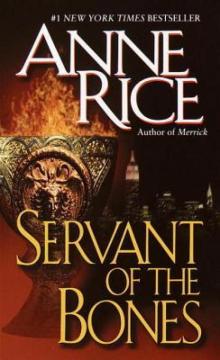 Servant of the Bones
Servant of the Bones Of Love and Evil
Of Love and Evil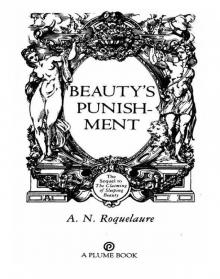 Beauty's Punishment
Beauty's Punishment Cry to Heaven
Cry to Heaven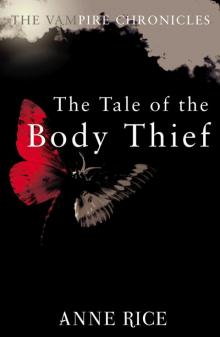 The Tale of the Body Thief
The Tale of the Body Thief The Witching Hour
The Witching Hour Memnoch the Devil
Memnoch the Devil Blackwood Farm
Blackwood Farm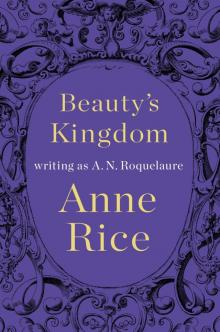 Beauty's Kingdom
Beauty's Kingdom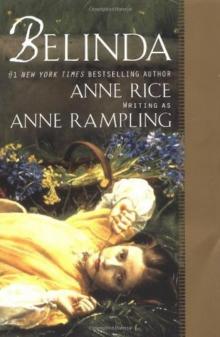 Belinda
Belinda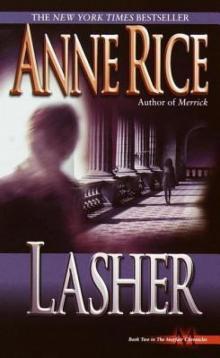 Lasher
Lasher Vittorio, the Vampire
Vittorio, the Vampire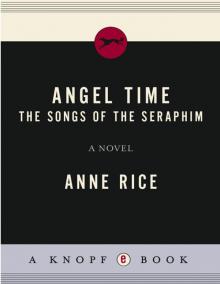 Angel Time
Angel Time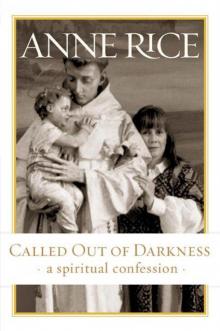 Called Out of Darkness: A Spiritual Confession
Called Out of Darkness: A Spiritual Confession Blood And Gold
Blood And Gold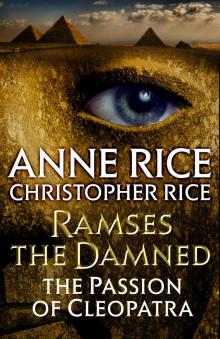 The Passion of Cleopatra
The Passion of Cleopatra Taltos
Taltos Exit to Eden
Exit to Eden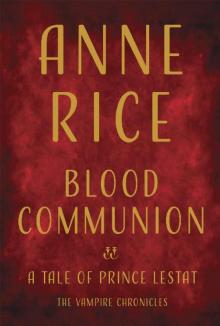 Blood Communion (The Vampire Chronicles #13)
Blood Communion (The Vampire Chronicles #13) The Wolf Gift
The Wolf Gift The Wolves of Midwinter
The Wolves of Midwinter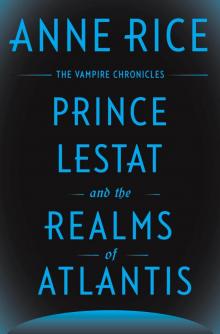 Prince Lestat and the Realms of Atlantis
Prince Lestat and the Realms of Atlantis The Ultimate Undead
The Ultimate Undead The Vampire Lestat tvc-2
The Vampire Lestat tvc-2 The Road to Cana
The Road to Cana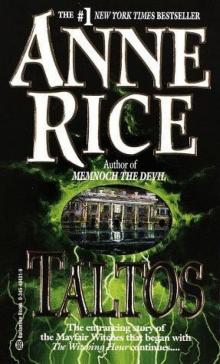 Taltos lotmw-3
Taltos lotmw-3 Merrick tvc-7
Merrick tvc-7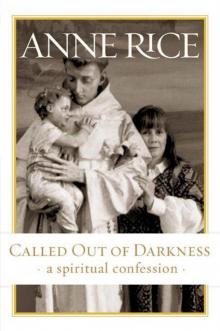 Called Out of Darkness
Called Out of Darkness Pandora - New Vampires 01
Pandora - New Vampires 01 Bllod and Gold
Bllod and Gold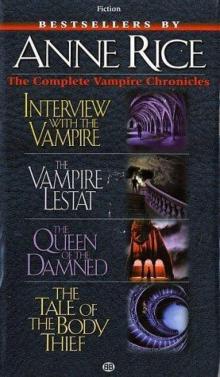 The Queen Of the Damned: Vampire Chronicles
The Queen Of the Damned: Vampire Chronicles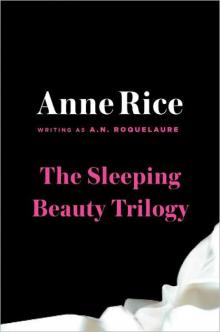 The Sleeping Beauty Trilogy
The Sleeping Beauty Trilogy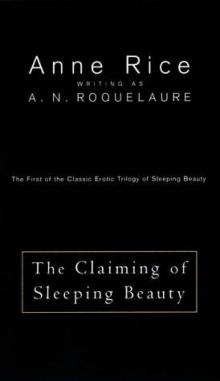 The Claiming of Sleeping Beauty b-1
The Claiming of Sleeping Beauty b-1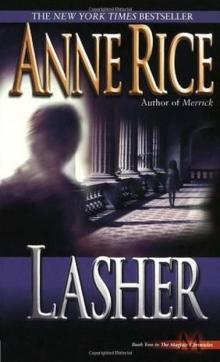 Lasher lotmw-2
Lasher lotmw-2 The Tale of the Body Thief tvc-4
The Tale of the Body Thief tvc-4 The Vampire Chronicles Collection
The Vampire Chronicles Collection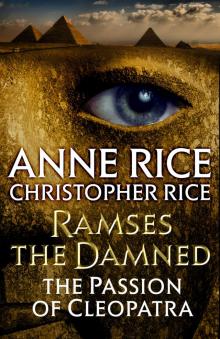 Ramses the Damned
Ramses the Damned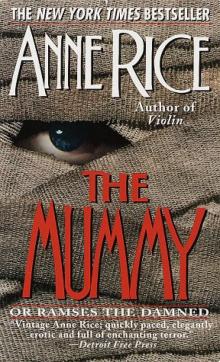 The Mummy - or Ramses the Damned
The Mummy - or Ramses the Damned Vittorio, The Vampire - New Vampires 02
Vittorio, The Vampire - New Vampires 02 The Vampire Armand tvc-6
The Vampire Armand tvc-6 Queen of the Damned tvc-3
Queen of the Damned tvc-3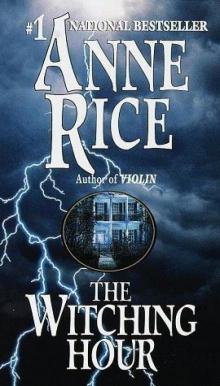 The witching hour lotmw-1
The witching hour lotmw-1 Feast of All Saints
Feast of All Saints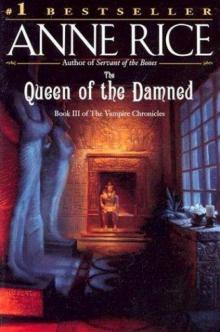 Queen of the Damned
Queen of the Damned The Wolves of Midwinter twgc-2
The Wolves of Midwinter twgc-2 The Mummy
The Mummy Blood and Gold tvc-8
Blood and Gold tvc-8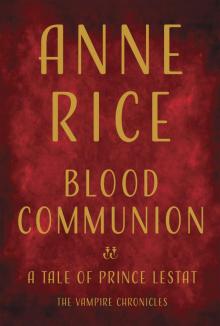 Blood Communion
Blood Communion Interview with the Vampire tvc-1
Interview with the Vampire tvc-1 Prince Lestat: The Vampire Chronicles
Prince Lestat: The Vampire Chronicles